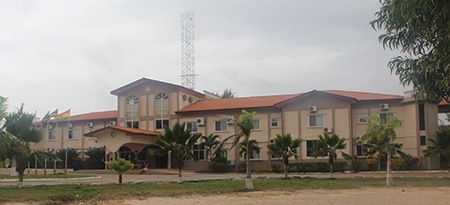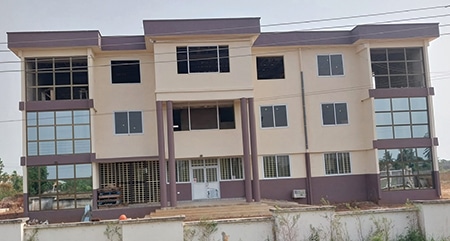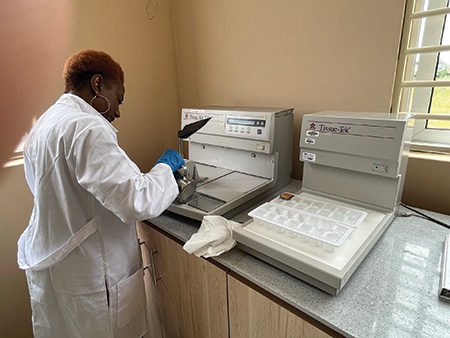Sanjai Nagendra, MD, MMM

Dr. Nagendra
February 2023—I was fortunate last summer to be part of a team established to build a histology laboratory in rural Ghana. Despite our many challenges, we succeeded in building a laboratory where specimens can now be processed for pathological interpretation. Although many obstacles remain, this laboratory offers great potential to improve the pathology services provided to a large portion of rural Ghana.
Ghana spent about $75 on health care per person in 2019 (compared with $10,900 in the U.S.). Most of the health care is administered through the Ghana Health Service and paid for by the government through the Ghana National Health Insurance Scheme, and most government hospitals are in urban centers. Although the National Health Insurance Scheme was initiated to provide universal health care with an annual fee, many rural Ghanaians do not have this insurance coverage for several reasons. With rising costs, the coverage is limited, leaving a large segment of the population to pay for health care out of pocket. Many rural Ghanaians earn less than $2 per day, so even if they have access to health care they are unable to afford it.

Dr. Agamah
Only about 30 pathologists practice in Ghana (population 33 million), the majority of whom are associated with government institutions. Thus, collective national surgical pathology specimen volumes remain severely constrained—below 20,000 per year. The volumes are low for other reasons. First, unlike in the United States, surgeons in Ghana do not readily biopsy lesions. Resections, when they are done, may not go through pathological examination. Second, only a few histology laboratories exist in the country, and in these laboratories instrumentation is aging and the number of trained personnel is limited. Thus, pathologists are not driven to become surgical pathologists. Instead, they perform forensic autopsies, which offers compensation.
More recently, private surgical pathology laboratories have begun to operate in the country, and they are increasingly popular for their reliability and superior turnaround times.
Twenty-six years ago, Ghanaian colleague Edem Agamah, MD, professor of medicine and hematologist/oncologist at Southern Illinois School of Medicine, Springfield, established the not-for-profit International Health and Development Network (IHDN). Its mission was aligned with the WHO mission: to provide the highest possible level of health . . . and to keep the world safe and serve the vulnerable. The mission was established in the Volta region of southeastern Ghana near the village of Agbozume, about 100 miles east of the capital, Accra. The Volta region is home to about 2 million people, many of whom are weavers, traders, fishermen, and farmers and earn less than $2 a day. Early on, Dr. Agamah and other mission volunteers saw multitudes of patients under a mango tree. Later they moved their operations into Dr. Agamah’s parents’ living room, an arrangement Dr. Agamah knew would be inadequate for long-term care of the population.
IHDN Mission Hospital, Agbozume, Ghana
Dr. Agamah’s vision was to build a standing facility, and, in 2008, after years of bureaucratic and logistical difficulties, the IHDN Mission Hospital opened. By 2022, and 40 mission trips later, the hospital was providing a significant amount of care for rural Eastern Ghana. The data for 2021 are as follows: outpatient visits: 37,138; inpatient visits: 3,427; surgical operations: 329, of which 240 were major surgeries; and babies delivered: 582.

Newly constructed pathology laboratory
As early as 2014, as the mission hospital was growing, Dr. Agamah had a new vision: to provide cancer care for patients in the region. A histology laboratory had to be built to do so. Dr. Agamah and I spoke with each other to plan how it could be accomplished.

Embedding station workaround
Five years passed, and in 2019 I partnered with Labcorp’s anatomic pathology department at Labcorp’s Center for Esoteric Testing and Atlantic Regional Laboratories in Burlington, NC, to understand what types of equipment were needed to build the laboratory. Over the next year, I worked with Labcorp’s sourcing and procurement department to locate used equipment the company could donate. It was shipped to the Midwest mission distribution center, Pawnee, Ill., pending evaluation by an IHDN member. By late winter 2022, IHDN had recruited Muriel Washington, pathology manager and histotechnologist at Springfield (Ill.) Memorial Hospital, who evaluated the equipment and found the tissue processor and embedding center to be irreparable.
 CAP TODAY Pathology/Laboratory Medicine/Laboratory Management
CAP TODAY Pathology/Laboratory Medicine/Laboratory Management
